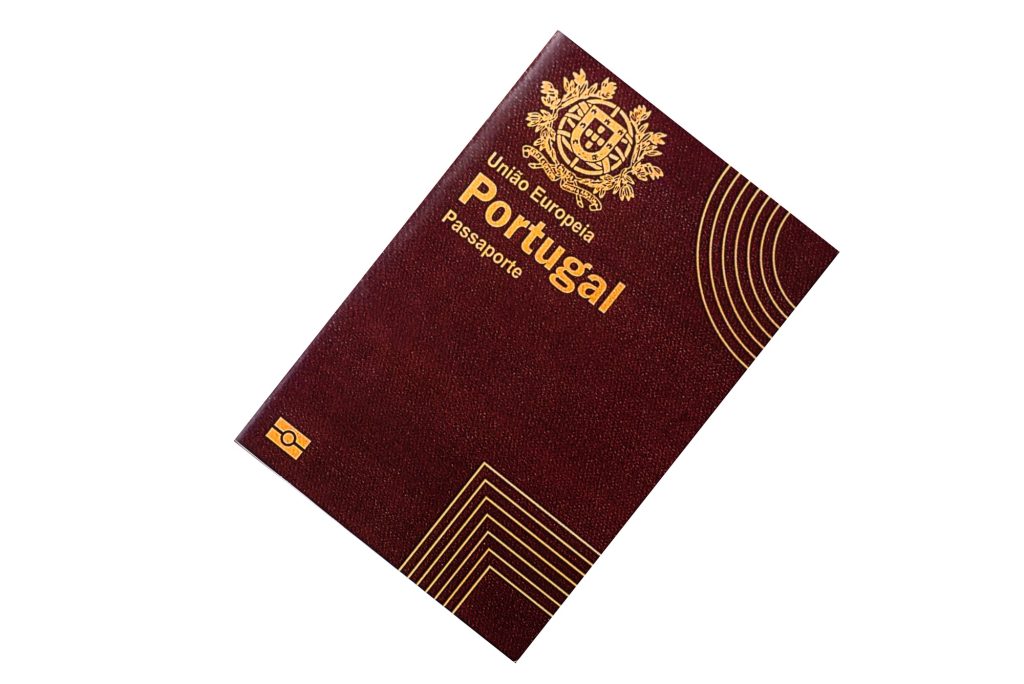Portugal’s 19 Best Cities for Expats 2025: Complete Living Guide 🇵🇹
Why Choose Portugal: The Expat Revolution
Portugal has become Europe’s hottest expat destination, with foreign residents surging to over 1.1 million in 2024—a remarkable 33.6% increase in just one year. This Mediterranean gem offers an unbeatable combination: EU membership, 300+ days of sunshine, the 7th safest country ranking globally, and living costs 34% below the EU average.
The Portuguese government actively welcomes international residents through streamlined visa processes, including the innovative D8 digital nomad visa and the D7 passive income visa for retirees. With unemployment at just 6.2% and the tech sector alone creating 8,000+ new positions annually, Portugal offers genuine opportunities alongside lifestyle benefits.
This comprehensive guide analyzes all 19 major Portuguese cities, providing the detailed insights you need to make an informed decision about your new home. Whether you’re a digital nomad seeking fiber-optic paradise, a family requiring international schools, or a retiree chasing eternal spring weather, Portugal has the perfect city waiting for you.
Complete Cost Comparison of All 19 Cities
Understanding real living costs across Portugal’s diverse cities proves essential for planning your move. The variation between Portugal’s most expensive and most affordable cities exceeds 100%, making location choice critical for your budget and lifestyle.
📊 Monthly Living Costs Comparison Table (Single Person)
| City | Total Monthly Budget | Rent (1-bed center) | Food & Groceries | Transportation |
|---|---|---|---|---|
| Lisbon | €1,778-€2,500 | €1,100-€1,400 | €250-€400 | €40 |
| Porto | €1,400-€1,800 | €750-€950 | €200-€350 | €37 |
| Cascais | €1,600-€2,200 | €900-€1,200 | €250-€400 | €40 |
| Braga | €1,000-€1,300 | €500-€680 | €180-€300 | €30 |
| Coimbra | €900-€1,200 | €300-€550 | €180-€280 | €34 |
| Faro | €1,200-€1,500 | €650-€850 | €200-€350 | €35 |
| Funchal | €1,300-€1,700 | €700-€900 | €220-€380 | €30 |
| Sintra | €1,200-€1,600 | €600-€800 | €200-€350 | €40 |
| Aveiro | €950-€1,250 | €450-€650 | €180-€300 | €30 |
| Viseu | €850-€1,100 | €350-€500 | €170-€280 | €25 |
| Évora | €900-€1,200 | €400-€600 | €180-€300 | €28 |
| Setúbal | €1,000-€1,300 | €500-€700 | €190-€320 | €35 |
| Leiria | €900-€1,200 | €400-€600 | €180-€300 | €30 |
| Guimarães | €950-€1,250 | €450-€650 | €180-€300 | €30 |
| Viana do Castelo | €900-€1,200 | €400-€600 | €180-€300 | €28 |
| Lagos | €1,100-€1,400 | €600-€800 | €200-€350 | €30 |
| Albufeira | €1,200-€1,500 | €700-€900 | €220-€380 | €35 |
| Tavira | €1,000-€1,300 | €550-€750 | €190-€320 | €30 |
| Portimão | €1,100-€1,400 | €600-€800 | €200-€350 | €32 |
📋 Family Budget Requirements (Family of Four)
Living as a family in Portugal requires careful budget planning. Major cities demand significantly higher budgets, but the quality of life often justifies the expense:
- Premium locations (Lisbon, Cascais, Porto): €3,500-€5,000/month
- Mid-tier cities (Braga, Faro, Funchal): €2,500-€3,500/month
- Budget-friendly options (Viseu, Leiria, Évora): €2,000-€3,000/month
These budgets include accommodation, utilities, food, transportation, and moderate entertainment. Education costs vary dramatically—international schools in Lisbon charge €8,000-€25,000 annually, while public schools remain free but require Portuguese proficiency.
Lisbon: The Capital Experience
Population: 545,000 (2.8 million metro)
Monthly Budget: €1,778-€2,500 (single) | €3,500-€5,000 (family)
Best For: Career professionals, entrepreneurs, culture lovers
Lisbon reigns as Portugal’s undisputed economic and cultural capital. The city has transformed into Southern Europe’s leading tech hub, hosting offices of Google, Microsoft, and Amazon alongside a thriving startup ecosystem. With over 100 coworking spaces and 20,000+ digital nomads, Lisbon offers unparalleled networking opportunities.
The job market remains Portugal’s most dynamic. Tech professionals earn €2,500-€4,000 monthly, while marketing managers command €2,000-€3,500. The average after-tax salary of €1,595 provides comfortable living despite higher costs. English-speaking positions abound in tech, finance, tourism, and digital marketing sectors.
Housing presents the biggest challenge, with central one-bedroom apartments averaging €1,100-€1,400. Popular neighborhoods like Príncipe Real and Santos see fierce competition. However, excellent public transport (€40 monthly pass) makes outer neighborhoods viable alternatives.
Pros:
- Best job market in Portugal
- Vibrant international community
- World-class restaurants and nightlife
- Excellent healthcare and education options
- Direct flights worldwide
Cons:
- Highest cost of living
- Tourist crowds in center
- Housing shortage and high rents
- Traffic congestion
- Can feel less “authentically Portuguese”
Porto: Northern Portugal’s Gem

Population: 238,000 (1.7 million metro)
Monthly Budget: €1,400-€1,800 (single) | €2,800-€3,800 (family)
Best For: Young professionals, digital nomads, wine enthusiasts
Porto perfectly balances authentic Portuguese character with modern amenities and opportunities. The city’s tech scene has exploded, with companies like Blip, Critical Software, and Farfetch establishing major operations. Living costs run 30% below Lisbon while maintaining excellent quality of life.
The historic center, a UNESCO World Heritage site, provides stunning backdrop for daily life. Porto’s food scene rivals Lisbon’s at half the price, while the nearby Douro Valley offers weekend wine country escapes. The city’s compact size makes it walkable and bike-friendly.
Employment opportunities concentrate in tech, tourism, and education. Average after-tax salaries range €1,200-€1,400, with strong growth in remote-friendly companies. The University of Porto creates constant innovation and international atmosphere.
Pros:
- Growing tech hub with lower costs
- Authentic Portuguese atmosphere
- Excellent wine and food culture
- Beautiful historic architecture
- Less touristy than Lisbon
Cons:
- Rainier climate (1,200mm annually)
- Fewer international schools
- Smaller job market than Lisbon
- Hilly terrain challenges mobility
- Limited direct international flights
Cascais: The Portuguese Riviera
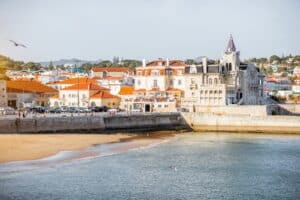
Population: 214,000
Monthly Budget: €1,600-€2,200 (single) | €3,500-€5,000 (family)
Best For: Affluent families, retirees, beach lovers
Cascais epitomizes refined coastal living just 30 minutes from Lisbon. This former fishing village transformed into Portugal’s most exclusive resort town, attracting wealthy expats with its pristine beaches, world-class golf courses, and sophisticated atmosphere. The year-round mild climate and exceptional safety make it a family paradise.
The town excels in international education, with multiple schools offering British, American, and IB curricula. St. Julian’s School and other prestigious institutions draw expatriate families. The Marina hosts luxury yachts, while the historic center maintains Portuguese charm despite gentrification.
Employment opportunities primarily exist in tourism, real estate, and services catering to affluent residents. Many residents commute to Lisbon via the efficient train line (40 minutes, €2.25). The town’s premium positioning means higher costs across all categories.
Pros:
- Exceptional quality of life
- Beautiful beaches and coastline
- Excellent international schools
- Safe, family-friendly environment
- Easy access to Lisbon
Cons:
- Very expensive housing
- Tourist crowds in summer
- Limited job market
- Can feel like an “expat bubble”
- Parking difficulties
Sintra: Fairy Tale Living

Population: 385,000
Monthly Budget: €1,200-€1,600 (single) | €2,800-€4,000 (family)
Best For: Families, artists, nature lovers
Sintra offers a unique living experience amid UNESCO World Heritage palaces and mystical forests. Just 45 minutes from Lisbon by train, this mountain town provides cooler temperatures and enchanting atmosphere at more reasonable prices than coastal alternatives.
The municipality spans from historic Sintra-Vila to coastal Praia das Maçãs, offering diverse living options. The microclimate brings frequent mists and lush vegetation, creating fairytale ambiance but also humidity challenges. International families appreciate proximity to Lisbon’s schools while enjoying spacious housing and nature access.
Local employment remains limited, with most residents commuting to Lisbon or working remotely. The tourist economy provides seasonal opportunities, while creative professionals find inspiration in the romantic setting.
Pros:
- UNESCO World Heritage setting
- Cooler climate than coast
- More affordable than Cascais
- Excellent train connections
- Strong cultural scene
Cons:
- High humidity and frequent mist
- Tourist crowds at attractions
- Limited local employment
- Challenging driving/parking
- Remote area isolation
Braga: Portugal’s Hidden Tech City

Population: 193,000
Monthly Budget: €1,000-€1,300 (single) | €2,000-€3,000 (family)
Best For: Young professionals, tech workers, budget-conscious families
Braga surprises as Portugal’s best-kept secret for affordable urban living. This historic religious center has transformed into a dynamic tech hub, hosting Bosch, Continental, and numerous startups. The University of Minho brings 20,000 students, creating youthful energy in this traditionally conservative northern city.
Living costs remain remarkably low, with city-center one-bedrooms renting for €500-€680. The emerging tech sector offers competitive salaries, while proximity to Porto (45 minutes) expands opportunities. Recent infrastructure investments include fiber optic coverage and modern coworking spaces.
The city balances tradition with innovation, offering authentic Portuguese life at bargain prices. Growing international community and new international school options make Braga increasingly family-friendly.
Pros:
- Lowest costs among major cities
- Growing tech employment
- Authentic Portuguese culture
- Excellent healthcare facilities
- Strategic northern location
Cons:
- Rainy climate (1,500mm annually)
- Conservative social atmosphere
- Limited nightlife options
- Fewer English speakers
- Smaller airport connections
Coimbra: University City Charm
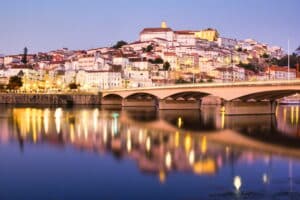
Population: 144,000
Monthly Budget: €900-€1,200 (single) | €2,000-€2,800 (family)
Best For: Students, academics, remote workers, budget-conscious expats
Coimbra’s prestigious university, founded in 1290, defines this historic city’s character. Home to 50,000+ students including 8,000 internationals, Coimbra offers intellectual stimulation and cosmopolitan atmosphere at rock-bottom prices. The UNESCO World Heritage university campus crowns the hillside city.
Living costs rank among Portugal’s lowest, with historic center apartments from €300-€550. The compact, walkable city eliminates transportation expenses. Student presence ensures vibrant cultural life, from traditional Fado to modern festivals. The central location between Lisbon and Porto (2 hours each) provides easy access to both major cities.
Employment concentrates in education, healthcare, and research. The university and affiliated institutions offer positions for qualified professionals. Growing tech incubators attract startups, while 279 English-speaking positions currently advertise across sectors.
Pros:
- Lowest living costs in major cities
- Rich academic and cultural life
- Strategic central location
- Beautiful historic architecture
- Safe, walkable city center
Cons:
- Limited job market outside education
- Steep hills challenge mobility
- Student party noise in center
- Hot summers (35°C+)
- Fewer international amenities
Faro: Gateway to the Algarve
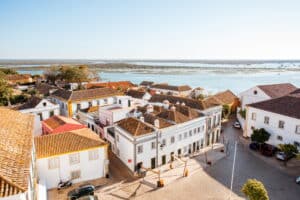
Population: 65,000
Monthly Budget: €1,200-€1,500 (single) | €2,500-€3,500 (family)
Best For: Year-round Algarve living, professionals, families
Faro stands apart from typical Algarve tourist towns as a working regional capital. The city maintains authentic Portuguese character while serving as the administrative, educational, and healthcare hub for southern Portugal. The international airport provides excellent European connections.
The University of Algarve brings academic atmosphere and employment opportunities beyond tourism. The regional hospital and government offices provide stable, year-round jobs. The historic center, encircled by ancient walls, offers charming living away from beach tourism chaos.
Ria Formosa Natural Park provides spectacular beaches and nature just minutes from the city. The marina and waterfront promenade create pleasant leisure spaces. Housing costs remain reasonable compared to resort towns, with one-bedrooms averaging €650-€850.
Pros:
- Authentic city with real economy
- Excellent healthcare facilities
- International airport access
- Beautiful natural surroundings
- Year-round amenities
Cons:
- Less picturesque than coastal villages
- Hot summers (30°C+)
- Limited cultural offerings
- Tourism impacts in summer
- Industrial outskirts
Lagos: Dramatic Coastline Living

Population: 35,000
Monthly Budget: €1,100-€1,400 (single) | €2,300-€3,200 (family)
Best For: Digital nomads, surfers, young expats
Lagos combines spectacular natural beauty with practical livability. The dramatic clifftop scenery and golden beaches attract a younger, active expat community. The historic center maintains charm despite tourist development, while modern amenities support year-round living.
The town has become a digital nomad hotspot, with several coworking spaces and strong expat networks. Surf culture dominates, with numerous schools and shops. The marina attracts sailing enthusiasts, while the nightlife rivals larger cities during summer.
Employment focuses on tourism, with seasonal fluctuations. Many expats run small businesses, teach languages, or work remotely. The growing digital nomad community creates networking opportunities and social connections.
Pros:
- Stunning natural beauty
- Active outdoor lifestyle
- Vibrant expat community
- Good infrastructure
- Excellent beaches
Cons:
- Tourist crowds in summer
- Seasonal economy
- Rising housing costs
- Party town reputation
- Limited winter activities
Albufeira: Tourist Hub Reality
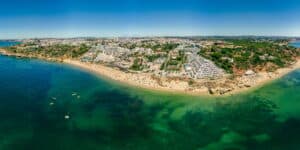
Population: 44,000
Monthly Budget: €1,200-€1,500 (single) | €2,500-€3,500 (family)
Best For: Tourism workers, party lovers, seasonal living
Albufeira represents the Algarve’s tourism extremes, from charming old town to notorious “Strip” party zone. Portugal’s tourism capital offers abundant seasonal employment but challenges for year-round residents seeking authentic Portuguese life.
The municipality splits distinctly: the historic center maintains traditional charm with cobblestone streets and clifftop views, while the Strip caters to package tourism with bars and nightclubs. Choosing your neighborhood proves critical for quality of life.
Employment revolves entirely around tourism, with hotels, restaurants, and entertainment venues hiring constantly during season. Winter brings dramatic slowdown, with many businesses closing November-March. Housing varies from affordable inland apartments to premium beachfront properties.
Pros:
- Abundant seasonal employment
- Beautiful beaches
- Lively entertainment scene
- International atmosphere
- Good transport connections
Cons:
- Extreme seasonal fluctuations
- Party tourism dominates
- Difficult to integrate locally
- Many winter closures
- Traffic and parking nightmares
Tavira: Authentic Algarve

Population: 26,000
Monthly Budget: €1,000-€1,300 (single) | €2,200-€3,000 (family)
Best For: Retirees, families, authentic Portugal seekers
Tavira stands as the Algarve’s best-preserved gem, maintaining authentic Portuguese character despite growing expat interest. This “Venice of the Algarve” features traditional architecture, 37 churches, and car-free Ilha de Tavira beach accessible only by ferry.
The town attracts discerning expats, particularly British retirees, creating established support networks while preserving local culture. The slower pace and traditional values appeal to those seeking genuine Portuguese integration. Year-round amenities and services cater to permanent residents rather than tourists.
Healthcare facilities include a modern hospital and numerous private clinics. The riverside location and salt pans create unique natural beauty. Housing remains affordable, with charming townhouses and modern apartments available at reasonable prices.
Pros:
- Authentic Portuguese atmosphere
- Established expat community
- Beautiful natural setting
- Affordable quality housing
- Excellent healthcare
Cons:
- Limited employment options
- Quiet winter months
- Fewer international amenities
- Distance from airport (45 min)
- Traditional/conservative attitudes
Portimão: Working Algarve
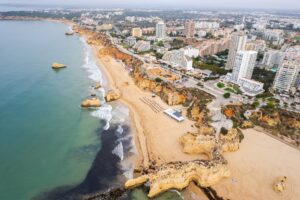
Population: 59,000
Monthly Budget: €1,100-€1,400 (single) | €2,300-€3,200 (family)
Best For: Working families, water sports enthusiasts
Portimão offers rare Algarve combination: real economy beyond tourism with beach access. The second-largest Algarve city maintains industrial and commercial sectors, providing year-round employment. The renovated riverfront and Praia da Rocha beach balance work and leisure.
The city hosts major shopping centers, hospital facilities, and government services. The autodrome attracts motorsport events, while the marina and fishing port maintain maritime traditions. Growing expat community appreciates practical amenities over tourist gloss.
Employment opportunities span retail, healthcare, services, and tourism. The industrial zone hosts manufacturing and logistics operations. Many residents work in Portimão while living in quieter surrounding villages.
Pros:
- Diverse economy beyond tourism
- Excellent shopping and services
- Beautiful Praia da Rocha beach
- Good healthcare facilities
- More affordable than resort towns
Cons:
- Less charming than villages
- Industrial areas
- Traffic congestion
- Tourist crowds at beach
- Limited cultural offerings
Funchal: Island Paradise
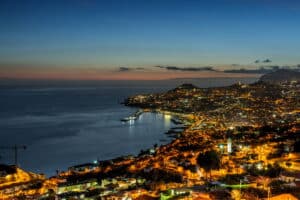
Population: 112,000
Monthly Budget: €1,300-€1,700 (single) | €2,800-€3,800 (family)
Best For: Digital nomads, retirees, nature lovers
Funchal offers unique island living with year-round spring climate (18-26°C). Madeira’s capital has emerged as Europe’s top digital nomad destination, boasting Portugal’s fastest internet and government-supported remote work initiatives including free coworking spaces in Ponta do Sol.
The dramatic mountain-meets-ocean setting provides spectacular natural beauty. Cable cars access mountain trails, while the historic center offers colonial charm. The international airport connects directly to major European cities, overcoming island isolation.
Tourism dominates employment, but growing tech sector and remote work opportunities diversify the economy. The established expat community includes many Northern Europeans escaping harsh winters. Healthcare facilities rank among Portugal’s best.
Pros:
- Perfect year-round climate
- Fastest internet in Portugal
- Stunning natural beauty
- Excellent healthcare
- Growing digital nomad scene
Cons:
- Island isolation
- Higher costs than mainland
- Limited job diversity
- Steep terrain challenges
- Tourist cruise ship crowds
Aveiro: The Portuguese Venice
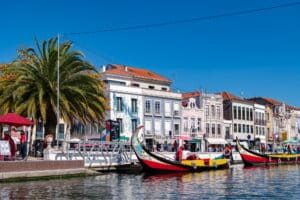
Population: 80,000
Monthly Budget: €950-€1,250 (single) | €2,100-€2,900 (family)
Best For: Families, university staff, maritime industry workers
Aveiro charms with its canal network, colorful moliceiro boats, and Art Nouveau architecture. This coastal city combines university town atmosphere with maritime traditions, creating unique living environment at affordable prices. The nearby beaches and Ria de Aveiro lagoon offer exceptional nature access.
The University of Aveiro, renowned for technology and sciences, attracts international students and researchers. The ceramics and salt industries maintain traditional importance while tech companies establish operations. The compact center proves highly walkable with excellent bike infrastructure.
Quality of life ranks high with good healthcare, education options, and cultural offerings. The moderate climate avoids extremes, while proximity to Porto (75km) expands opportunities. Housing remains affordable with modern apartments averaging €450-€650.
Pros:
- Unique canal city character
- Affordable university town
- Beautiful beaches nearby
- Growing tech sector
- Excellent bike infrastructure
Cons:
- Limited international community
- Smaller job market
- Humid maritime climate
- Tourist crowds in summer
- Language barrier stronger
Viseu: Best Value Living
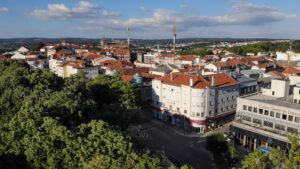
Population: 100,000
Monthly Budget: €850-€1,100 (single) | €1,900-€2,600 (family)
Best For: Remote workers, retirees, budget-conscious families
Viseu consistently ranks as Portugal’s best city for quality of life, combining historic charm with modern amenities at unbeatable prices. This inland gem offers authentic Portuguese living without tourist crowds or coastal price premiums. The well-preserved medieval center creates atmospheric daily life.
The economy centers on wine production, agriculture, and services. While international job opportunities remain limited, remote workers find ideal conditions with reliable infrastructure and rock-bottom costs. One-bedroom apartments rent for just €350-€500 in excellent locations.
Healthcare facilities serve the region effectively, while cultural life surprises with museums, theaters, and festivals. The surrounding Dão wine region provides weekend exploration. Winter cold and summer heat (35°C+) represent the main climate challenges.
Pros:
- Lowest cost of living
- Highest quality of life rankings
- Beautiful historic center
- Excellent healthcare
- Authentic Portugal experience
Cons:
- Very limited job market
- Extreme seasonal temperatures
- Minimal English spoken
- No international schools
- Distance from airports
Évora: UNESCO Heritage City

Population: 57,000
Monthly Budget: €900-€1,200 (single) | €2,000-€2,800 (family)
Best For: History lovers, retirees, artists
Évora’s entire historic center holds UNESCO World Heritage status, offering daily life amid Roman temples, medieval walls, and Renaissance palaces. This Alentejo capital provides profound historical atmosphere at surprisingly affordable prices, attracting culture-seeking expats.
The University of Évora brings student energy to this otherwise sleepy city. Tourism provides some employment, while regional government and services offer Portuguese-speaking positions. Many expats operate small businesses or work remotely while enjoying the relaxed pace.
The Alentejo region’s extreme climate brings scorching summers (40°C+) and chilly winters. However, the low humidity and clear skies appeal to many. Local gastronomy and wine culture rank among Portugal’s finest.
Pros:
- UNESCO World Heritage setting
- Very affordable living
- Rich cultural heritage
- Excellent regional cuisine
- Peaceful, safe environment
Cons:
- Extreme summer heat
- Very limited employment
- Minimal expat community
- Distance from coast
- Slow pace may bore some
Setúbal: Industrial Meets Beach
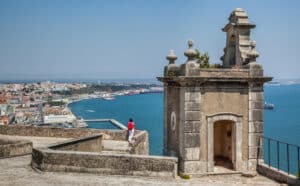
Population: 120,000
Monthly Budget: €1,000-€1,300 (single) | €2,200-€3,000 (family)
Best For: Commuters to Lisbon, industrial workers, beach lovers
Setúbal offers working-class authenticity just 50km from Lisbon. This industrial port city surprises with beautiful beaches, excellent seafood, and improving quality of life. The Arrábida Natural Park provides stunning scenery, while commuter trains connect to Lisbon in 45 minutes.
The economy revolves around manufacturing, port operations, and fishing. Major employers include automotive plants and logistics centers. While not glamorous, Setúbal provides honest living with good salaries and reasonable costs. The city beach and nearby Tróia peninsula offer weekend escapes.
Recent waterfront regeneration improves livability, while maintaining authentic Portuguese character. The growing commuter population brings gradual gentrification and improved services.
Pros:
- Proximity to Lisbon
- Industrial job opportunities
- Beautiful beaches nearby
- Authentic Portuguese life
- Affordable housing
Cons:
- Industrial pollution
- Limited cultural scene
- Fewer expat amenities
- Working-class rough edges
- Commuter town feel
Leiria: Central Portugal Value
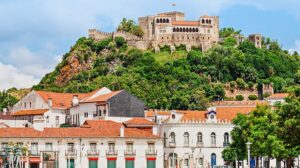
Population: 130,000
Monthly Budget: €900-€1,200 (single) | €2,000-€2,800 (family)
Best For: Remote workers, small business owners, families
Leiria delivers exceptional value in Portugal’s geographic center. This often-overlooked city combines castle-topped historic charm with modern amenities at budget prices. The riverside setting and proximity to both beaches (20km) and mountains creates diverse lifestyle options.
The local economy focuses on plastics manufacturing, ceramics, and services. While international opportunities remain limited, the Polytechnic Institute brings some diversity. Many expats establish small businesses or work remotely while enjoying low costs and high quality of life.
The city offers surprising cultural vibrancy with theaters, museums, and festivals. Healthcare facilities serve the region well. The temperate climate avoids extremes, while Lisbon and Porto remain accessible for day trips.
Pros:
- Strategic central location
- Very affordable living
- Good infrastructure
- Beach and mountain access
- Growing startup scene
Cons:
- Limited job market
- Small expat community
- Less touristic appeal
- Language barrier
- Quiet nightlife
Guimarães: Where Portugal Began

Population: 160,000
Monthly Budget: €950-€1,250 (single) | €2,100-€2,900 (family)
Best For: History enthusiasts, remote workers, culture lovers
Guimarães holds special significance as Portugal’s birthplace, with its medieval center earning UNESCO recognition. This northern city balances historical importance with modern dynamism, offering authentic Portuguese life at reasonable costs. The preserved architecture creates atmospheric daily living.
The University of Minho campus brings international students, while textile industries maintain economic importance. The cultural scene punches above its weight with museums, festivals, and artistic initiatives. Proximity to Porto (50km) expands employment options for commuters.
The compact, walkable center facilitates car-free living. Local pride runs deep, creating strong community bonds. While tourism grows, Guimarães maintains authentic character and local prices.
Pros:
- UNESCO World Heritage center
- Rich cultural offerings
- Affordable authentic living
- Close to Porto
- Strong community spirit
Cons:
- Limited direct employment
- Northern rain (1,200mm)
- Conservative atmosphere
- Fewer expat services
- Weekend tourist crowds
Viana do Castelo: Northern Coast Beauty
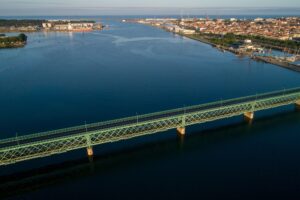
Population: 89,000
Monthly Budget: €900-€1,200 (single) | €2,000-€2,800 (family)
Best For: Surf enthusiasts, nature lovers, remote workers
Viana do Castelo combines Atlantic coastline with northern Portuguese authenticity. This understated gem offers exceptional beaches, historic architecture, and outdoor activities at fraction of Algarve prices. The Lima River estuary creates unique natural beauty.
The economy centers on shipbuilding, fishing, and regional services. Wind energy development brings new opportunities. While international jobs remain scarce, remote workers find ideal conditions with good infrastructure and low costs. The growing surf scene attracts younger expats.
Cultural traditions remain strong, from elaborate festivals to distinctive architecture. The municipal market showcases regional produce. Healthcare and education meet high standards despite the city’s size.
Pros:
- Beautiful beaches and nature
- Very affordable coastal living
- Excellent surf conditions
- Authentic Portuguese culture
- Low tourist impact
Cons:
- Rainy climate (1,400mm)
- Very limited job market
- Minimal English spoken
- Distance from major cities
- Quiet winter months
Making Your Choice: Comparison Guide
📊 Complete City Comparison Matrix
| City | Best For | Cost Level | Job Market | Expat Scene | Climate |
|---|---|---|---|---|---|
| Lisbon | Careers | Very High | Excellent | Huge | Mediterranean |
| Porto | Balance | High | Very Good | Large | Atlantic |
| Cascais | Luxury | Very High | Limited | Large | Perfect |
| Sintra | Families | High | Limited | Moderate | Humid |
| Braga | Value | Low | Growing | Emerging | Rainy |
| Coimbra | Students | Very Low | Academic | Moderate | Variable |
| Faro | Year-round | Medium | Good | Large | Hot |
| Lagos | Nomads | Medium | Seasonal | Large | Mild |
| Albufeira | Tourism | Medium | Seasonal | Huge | Hot |
| Tavira | Retirees | Low-Med | Limited | Large | Mild |
| Portimão | Families | Medium | Moderate | Growing | Mild |
| Funchal | Nomads | Medium | Growing | Growing | Perfect |
| Aveiro | Families | Low | Limited | Small | Maritime |
| Viseu | Value | Very Low | Minimal | Tiny | Continental |
| Évora | Culture | Low | Minimal | Small | Extreme |
| Setúbal | Workers | Low-Med | Industrial | Small | Maritime |
| Leiria | Balance | Low | Limited | Small | Temperate |
| Guimarães | Culture | Low | Limited | Small | Atlantic |
| Viana | Nature | Low | Minimal | Tiny | Atlantic |
Key Decision Factors
For Career Growth: Choose Lisbon or Porto exclusively. Other cities lack substantial professional opportunities for international workers.
For Remote Work: Funchal leads with infrastructure and community, followed by Lisbon, Porto, and emerging hubs like Lagos and Braga.
For Families: Cascais offers premium education but demands high budgets. Sintra and Braga provide excellent alternatives. Aveiro surprises with family-friendly atmosphere.
For Retirement: Tavira combines climate, healthcare, and community perfectly. Funchal offers island paradise, while Évora provides cultural immersion at minimal cost.
For Budget Living: Viseu, Coimbra, and interior cities offer exceptional value. Expect to sacrifice international amenities for authentic experiences and savings.
Access Portugal: Your Integration Partner
Choosing your Portuguese city marks just the beginning. Successful relocation requires navigating complex bureaucracy, from obtaining your NIF to opening bank accounts and securing appropriate visas.
Access Portugal specializes in smoothing every step of your journey. Our services include:
- Visa consultation and application support
- NIF and NISS registration
- Bank account opening assistance
- Property search and rental contracts
- School enrollment for families
- Healthcare registration
- Insurance arrangements
Don’t let paperwork and language barriers complicate your Portuguese dream. Contact Access Portugal for personalized guidance tailored to your chosen city and circumstances.
FAQ: Choosing Your Portuguese City
Which Portuguese city has the best job opportunities for English speakers?
Lisbon dominates with 70% of Portugal’s English-speaking positions, particularly in tech, finance, and digital marketing. Porto follows with growing opportunities at 30% lower living costs. For seasonal work, Algarve cities offer abundant tourism positions from April-October.
What’s the minimum monthly budget needed for comfortable living in Portugal?
Budget requirements vary dramatically by city. Viseu and Coimbra offer comfortable living from €850-€1,000 monthly, while Lisbon and Cascais demand €1,800-€2,500. Most mid-sized cities like Braga, Faro, or Aveiro require €1,000-€1,500 for singles.
Which cities offer the best quality of life for families with children?
Cascais leads with premium international schools and family amenities but requires €3,500-€5,000 monthly. Braga emerges as the value choice with excellent public schools and safety at €2,000-€3,000. Sintra balances Lisbon proximity with nature access at moderate costs.
Where do most expats live in Portugal?
The Algarve hosts Portugal’s largest expat concentration (100,000+), particularly British retirees in Tavira, Vilamoura, and Albufeira. Lisbon attracts diverse internationals (50,000+), while Cascais and Porto have established communities of 20,000+ each.
Which Portuguese city has the best weather?
Funchal offers the most stable climate with year-round 18-26°C temperatures. The Algarve provides the most sunshine (300+ days) but with hot summers. Cascais achieves perfect balance with maritime moderation. Northern cities like Porto and Braga receive significantly more rainfall.
What are the best cities for remote workers and digital nomads?
Funchal tops the list with Portugal’s fastest internet and free coworking spaces. Lisbon offers unmatched networking but highest costs. Porto provides authentic experience with good infrastructure. Budget options include Lagos, Braga, and Coimbra.
How much does international school cost across different cities?
Lisbon’s premium schools charge €15,000-€25,000 annually. Porto and Cascais average €10,000-€18,000. The Algarve varies widely from €6,000-€20,000. Braga’s new international school offers quality education under €10,000.
Which city should I choose if I don’t speak Portuguese?
Lisbon, Cascais, and Albufeira function well with English only. Porto and Funchal have growing English-speaking services. The Algarve’s established expat communities provide English-language support. Smaller cities like Viseu or Viana do Castelo require Portuguese for daily life.
Your Portuguese Journey Awaits 🌟
Portugal’s 19 major cities offer extraordinary diversity, ensuring every expat finds their perfect match. From Lisbon’s career opportunities to Tavira’s retirement tranquility, from Braga’s budget-friendly dynamism to Funchal’s digital nomad paradise, your ideal Portuguese home exists.
Success in Portugal requires more than choosing the right city—it demands navigating complex bureaucracy, understanding local systems, and building proper foundations. Access Portugal stands ready to transform your Portuguese dream into reality.
Our comprehensive services include:
- Visa consultation and applications
- NIF and NISS registration
- Banking and financial setup
- Healthcare enrollment
- Property search assistance
- School enrollment support
- Business establishment
Don’t let paperwork, language barriers, or bureaucratic complexity delay your Portuguese adventure. Contact Access Portugal today for personalized guidance tailored to your chosen city and unique circumstances. Your new life in Portugal’s perfect city awaits!

